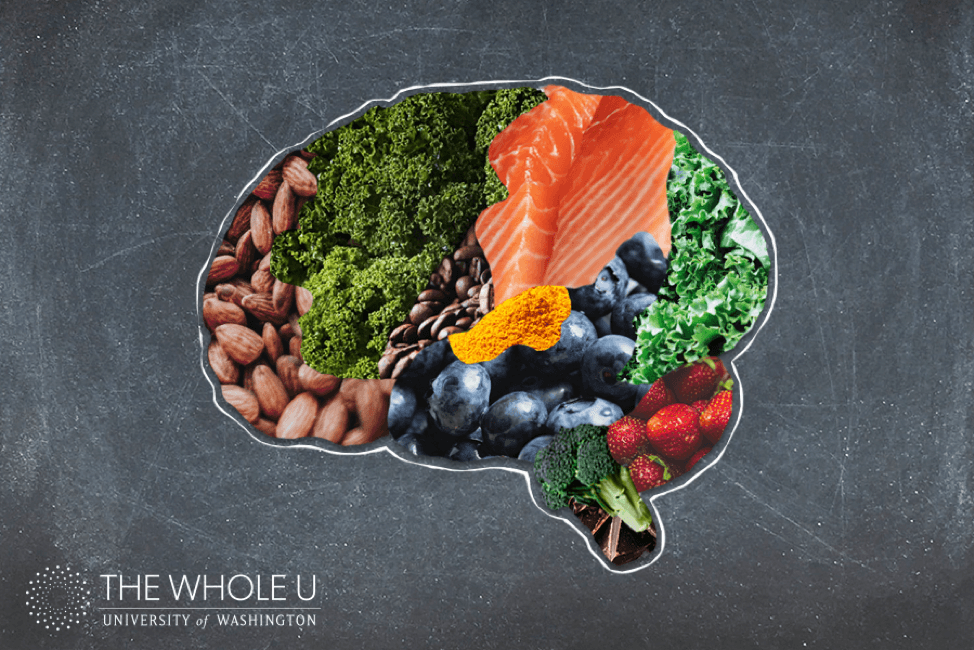
How Nutrition Impacts the Brain and Mental Health
It’s March, which means National Nutrition Month is officially here! This week, The Whole U begins our month-long celebration of food by focusing on nutrition and how it impacts brain health. We caught up with UW Medicine dietitian Kristine Carlson to highlight the importance of how our food choices impact brain function and mental health.
Learn more about National Nutrition Month here and be sure to register here if you haven’t already!
How is Brain and Mental Health Affected by Food?
Brain function and mental health might not be the first thing you think about when you think about the food and drinks you put into your body, but Kristine Carlson draws a comparison between the brain and another complex, high-performance machine.
“Most people probably don’t equate a healthy diet with a good mood or better memory,” Carlson says. “But, like an expensive car, our brains require premium fuel to function at its best. This function includes managing our emotions and mood disorders.”
Carlson says the old adage “You are what you eat” certainly applies when it comes to eating to nourish the brain and that there exists a great variety of foods that promote healthy brain function.
“There is no single magic food that one must eat for brain health,” Carlson says. “However, like with most approaches to nutrition and health, a variety of nutrients should be included in your diet for optimal benefits and brain health.”
Foods that Improve the Brain
Below, Kristine highlights some food items that research has shown to power brain and body alike.
 Green, leafy vegetables such as kale, spinach, collards and broccoli are rich in brain-healthy nutrients like vitamin K, lutein, folate and beta-carotene.
Green, leafy vegetables such as kale, spinach, collards and broccoli are rich in brain-healthy nutrients like vitamin K, lutein, folate and beta-carotene.
“These foods may slow cognitive decline which makes them great for protecting our brains and keeping us sharp.”
 Fatty fish, such as salmon, trout and sardines, are full of omega-3 fatty acids, major building blocks of the brain.
Fatty fish, such as salmon, trout and sardines, are full of omega-3 fatty acids, major building blocks of the brain.
“Omega-3s play a powerful role in sharpening memory and improving mood, as well as protecting your brain against decline.”
 Berries contain flavonoids, the natural plant pigments that give berries their brilliant hue.
Berries contain flavonoids, the natural plant pigments that give berries their brilliant hue.
These help improve memory.
 Tea and coffee. The two main components in tea and coffee – caffeine and antioxidants – can help your brain.
Tea and coffee. The two main components in tea and coffee – caffeine and antioxidants – can help your brain.
“Enjoy that morning cup for a sharpened sense of concentration.”
 Nuts are also high in omega 3 fatty acids, specifically alphalinoleic acid, which also help with improving memory.
Nuts are also high in omega 3 fatty acids, specifically alphalinoleic acid, which also help with improving memory.
 Turmeric and its active compound curcumin have strong anti-inflammatory and antioxidant benefits, which help the brain.
Turmeric and its active compound curcumin have strong anti-inflammatory and antioxidant benefits, which help the brain.
In research, turmeric has reduced symptoms of depression and Alzheimer’s disease.
 Dark chocolate and cocoa powder are packed with brain-boosting compounds, including flavonoids, caffeine and antioxidants.
Dark chocolate and cocoa powder are packed with brain-boosting compounds, including flavonoids, caffeine and antioxidants.
To feel more emotionally balanced and foster positive energy through our nutritional choices, Carlson advised us to “eat foods that give us energy, joy and fuel for our bodies.”
“Eating high-quality foods that contain vitamins, minerals and antioxidants will nourish the brain in a positive way,” she says.
At the same time, Kristine warns us that “a diet high in processed foods and refined sugars can impair brain function and worsen mental health symptoms.”
Debunking Food Myths
In this day and age, there is tons of information about what you should be eating and what food items are deemed good or bad for you. Thus, it can be difficult to sort through all the noise and identify what are myths or facts.
When it comes to myths around nutrition and brain health, Kristine points out, “you may see advertisements and ‘diet programs’ out there touting “superfoods” and “brain foods.”
To get the most out of your diet, “you should incorporate a variety of foods, eat a diet high in unprocessed foods and refined sugars, load up on colorful fruits and vegetables, and above all, enjoy and savor your food.”
So next time you are digging into a meal or grocery shopping, think about these foods that will help keep your mind sharp, focused, and balanced!
Get started today with The Whole U’s resources for eating well here!
Get even more from your experience working at the UW by heading to our events page where you’ll find do-it-yourself downloads that will help you take life to the next level—everything from helpful kitchen “cheat-sheets” for creating delicious, nutritious meals to workout plans for getting stronger and healthier overall.
One Thought on “How Nutrition Impacts the Brain and Mental Health”
On March 3, 2020 at 10:41 AM, Deirdre Sumida said:
I would think the number one thing to mention would be to avoid seed oils. “Deep Nutrition,” by Catherine Shanahan, is very instructive on this topic.
Comments are closed.